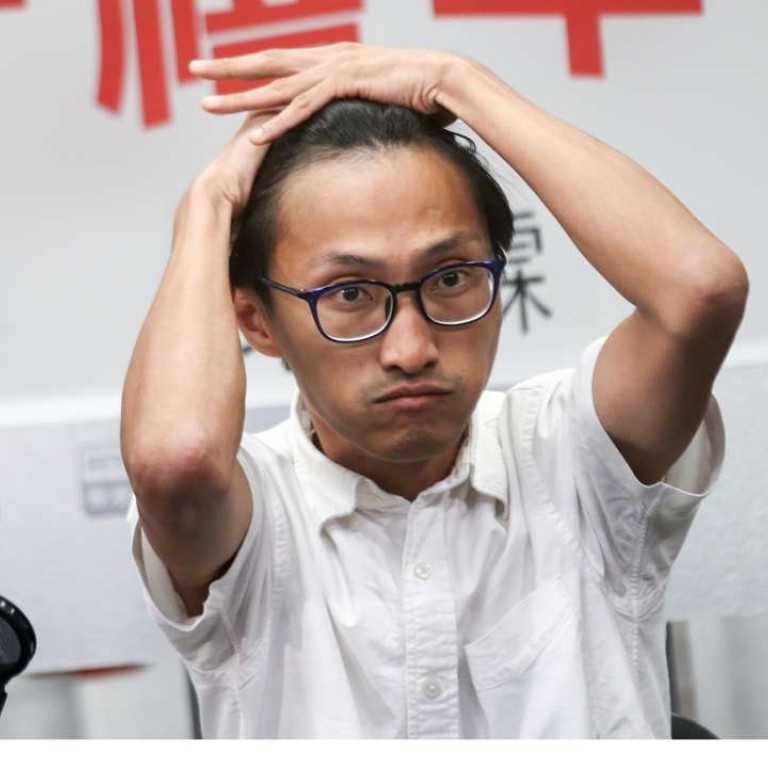
Can Beijing lift the cloud of fear casting a long shadow over Hong Kong?
Alice Wu says death threats and political intimidation are only heightening anxiety among citizens already racked with worry. What is needed above all is hope, to cast some sunlight on society and relations with the mainland
There’s no room for ambiguity or political differences when it comes to death threats. Such threats against lawmaker-elect Eddie Chu Hoi-dick and his family can only be condemned, and authorities need to get to the bottom of it, as soon as possible. The idea that someone feels they can use the threat of violence is a direct assault on all of us.
Crackdown on Hong Kong triads intensifies after death threats against lawmaker Eddie Chu
Equally disturbing is the case involving Ken Chow Wing-kan, who said he was forced to give up canvassing votes for the election due to threats made by “people from Beijing” and “friends working for mainland organisations here”. The good news is that these claims are being looked into by the chief secretary, and Chow’s Liberal Party colleagues are pursuing the matter in other ways. The bad news for Beijing is that these claims do not need verifying to fuel the menacing storm of fear that Hong Kong is already trapped in. Fear does not require the burden of proof.

Ken Chow alleges Beijing trio warned him to quit Hong Kong’s Legislative Council elections
Many see US presidential candidate Donald Trump’s campaign as one based on fear. His political rise has been attributed to his ability to stir up and capitalise on people’s latent fears. And Beijing needs to pay very close attention to how that works. With enough fearful people, it is easy to instil a false sense of security with irresponsible rhetoric.
By coughing up an “ultra-conservative” reform plan in the form of the August 31 decision, [Beijing] gave the Occupy movement the impetus it needed to happen, and for extreme localism to take root
Fearmongering politics is not a recent phenomenon. Former US president Richard Nixon said it best: “People react to fear, not love. They don’t teach that in Sunday School, but it’s true.”
We can’t escape history. A million people risked their lives to escape mainland China for better beginnings in Hong Kong from the 1950s to the 1980s in what is known as “The Great Exodus”. The very fear that triggered their flight stayed with them. And after June 4, we saw the largest exit from Hong Kong, triggered by a renewed fear. It’s part of our social fabric. Only a few days after James To Kun-sun’s close-call Legislative Council “super seat” victory, he went on air and articulated that same fear, saying: “I don’t want my young son to grow up and be run over by a tank.”
Whether To is profiteering from fear isn’t the point. The fact that it still resonates is. And this is the very same fear driving newly elected localist lawmakers to not just snub the invitation to National Day celebration events, but to use it as an opportunity to spit in Beijing’s face, calling it “a waste of time” and “the national day of a neighbouring country”. It’s fear speaking again, only it’s not “flight”, but “fight”. Beijing can fight back, out of its own fear of pro-independence forces, and focus all its efforts on fighting them as it did before by being preoccupied with the Occupy movement. By coughing up an “ultra-conservative” reform plan in the form of the August 31 decision, it gave the Occupy movement the impetus it needed to happen, and for extreme localism to take root.
Leung Chun-ying plays down political divide in Hong Kong as he welcomes new Legco faces
But just as fear sells, so can hope – look no further than Barack Obama’s phenomenal rise to the US presidency in 2008. So, take the localists’ cue, but instead of reacting in ways that reaffirm fearful suspicions and energise their supporters, surprise the rest of Hong Kong and the world. If Chu and like-minded localists are adamantly against restarting the political reform process because they think it will be a repeat of two years ago, prove them wrong, stop reinforcing the fear of the worst that gives life to their cause, and put on pause the mushrooming cloud of fear that has come to rule Hong Kong and dictate Beijing-Hong Kong relations.

Alice Wu is a political consultant and a former associate director of the Asia Pacific Media Network at UCLA

